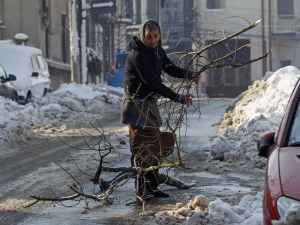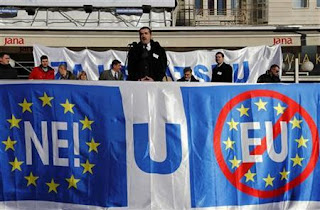Iran calls EU oil ban 'psychological warfare'

EU foreign policy chief Catherine Ashton holds a news conference at the end of a European Union foreign ministers meeting in Brussels January 23, 2012 - Source: Reuters
Iran has accused Europeans of waging "psychological warfare" after the EU banned imports of Iranian oil, joining the United States in new sanctions aimed at preventing Tehran from getting nuclear weapons. The Islamic Republic, which denies trying to build an atom bomb, scoffed at efforts to choke its oil exports, as Asia lines up to buy what Europe scorns. Some Iranians also renewed threats to stop Arab oil from leaving the Gulf and warned they might strike US targets worldwide if Washington used force to break any Iranian blockade of a strategically vital shipping route. Yet in three decades of confrontation between Tehran and the West, bellicose rhetoric and the undependable armoury of sanctions have become so familiar that the benchmark Brent crude oil price edged only 0.8% higher, and some of that was due to unrelated currency factors.” If any disruption happens regarding the sale of Iranian oil, the Strait of Hormuz will definitely be closed," Mohammad Kossari, deputy head of parliament's foreign affairs and national security committee, told Fars news agency a day after US, French and British warships sailed back into the Gulf."If America seeks adventures after the closure of the Strait of Hormuz, Iran will make the world unsafe for Americans in the shortest possible time," Kossari added, referring to an earlier US pledge to use its fleet to keep the passage open.The United States, which imposed its own sanctions against Iran's oil trade and central bank on December 31, welcomed the EU move, as did Israel which has warned it might attack Iran if sanctions do not deflect Tehran from a course that some analysts argue could potentially give Iran a nuclear bomb next year.US Secretary of State Hillary Clinton said in a statement with Treasury Secretary Timothy Geithner: "This new, concerted pressure will sharpen the choice for Iran's leaders and increase their cost of defiance of basic international obligations."
Calls for talks
Germany, France and Britain used the EU sanctions as a cue for a joint call to Tehran to renew long-suspended negotiations on its nuclear programme. Russia, like China a powerful critic of the Western approach, said talks might soon be on the cards.Iran, however, said new sanctions made that less likely. It is a view shared by some in the West who caution that such tactics risk hardening Iranian support for a nuclear programme that also seems to be subject to a covert "war" of sabotage and assassinations widely blamed on Israeli and Western agents. European Union foreign ministers who agreed an anticipated ban on imports of Iranian crude at a meeting in Brussels were so anxious not to penalise the ailing economies of Greece, Italy and others to whom Iran is a major oil supplier that the EU embargo will not take full effect until July 1. And the strategy will be reviewed in May to see if it should go ahead.Curbing Iran's oil exports is a double-edged sword, as Tehran's own response to the embargo clearly showed.Loss of revenue is painful for a clerical establishment that faces an awkward electoral test at a time of galloping inflation which is hurting ordinary people. But since Iran's Western-allied Arab neighbours are struggling to raise their own output to compensate, the curbs on Tehran's exports have driven up oil prices and raised costs for recession-hit Western industries.A member of Iran's influential Assembly of Experts, former intelligence minister Ali Fallahian, said Tehran should respond to the delayed-action EU sanctions by stopping sales to the bloc immediately, denying the Europeans time to arrange alternative supplies and damaging their economies with higher oil prices."The best way is to stop exporting oil ourselves before the end of this six months and before the implementation of the plan," the semi-official Fars news agency quoted him as saying.
"Psychological warfare"

"European Union sanctions on Iranian oil is psychological warfare," Iranian foreign ministry spokesman Ramin Mehmanparast said. "Imposing economic sanctions is illogical and unfair but will not stop our nation from obtaining its rights.” Deputy Foreign Minister Abbas Araqchi told the official IRNA news agency that the more sanctions were imposed on Tehran "the more obstacles there will be to solve the issue”. Iran’s oil ministry issued a statement saying the sanctions did not come as a shock. "The oil ministry has from long ago thought about it and has come up with measures to deal with any challenges," it said, according to IRNA.Mehmanparast said: "The European countries and those who are under American pressure, should think about their own interests. Any country that deprives itself from Iran's energy market, will soon see that it has been replaced by others.” China, Iran's biggest customer, has resisted US pressure to cut back its oil imports, as have other Asian economies to varying degrees. India's oil minister said today sanctions were forcing Iran to sell more cheaply and that India planned to take full advantage of that to buy as much as it could.The EU measures include an immediate ban on all new contracts to import, purchase or transport Iranian crude and petroleum products. However, EU countries with existing contracts can honour them up to July 1, and there will be a review of the plans before then.EU officials said they also agreed to freeze the assets of Iran's central bank and ban trade in gold and other precious metals with the bank and state bodies.EU foreign policy chief Catherine Ashton said: "I want the pressure of these sanctions to result in negotiations.” I want to see Iran come back to the table and either pick up all the ideas that we left on the table ... last year ... or to come forward with its own ideas." Iran has said it is willing to hold talks with Western powers, though there have been mixed signals on whether conditions imposed by both sides make new negotiations likely.
IAEA Inspectors visit

The Islamic Republic insists it is enriching uranium only to produce electricity and for other civilian uses. The start this month of a potentially bomb-proof - and once secret - enrichment plant has deepened scepticism abroad, however.The United Nations' nuclear watchdog, the International Atomic Energy Agency, confirmed plans for a visit next week by senior inspectors to try and clear up questions raised about the purpose of Iran's nuclear activities. Tehran is banned by international treaty from developing nuclear weaponry."The Agency team is going to Iran in a constructive spirit, and we trust that Iran will work with us in that same spirit," IAEA chief Yukiya Amano said in a statement announcing the December 29-31 visit.Iran, whose 'great power' ambitions face a setback from the difficulties of its Arab ally, Syrian President Bashar al-Assad, has powerful defenders in the form of Russia, which has built Iran a reactor, and China. Both permanent UN Security Council members argue that Western sanctions are counter-productive.Russian Foreign Minister Sergei Lavrov, classifying the EU embargo among "aggravating factors", said Moscow believed there was a good chance that talks between the six global powers and Iran could resume soon and that Russia would try to steer both Iran and the West away from further confrontation. His ministry issued an official statement expressing "regret and alarm": "What is happening here is open pressure and diktat, an attempt to 'punish' Iran for its intractable behaviour.” This is a deeply mistaken approach, as we have told our European partners more than once. Under such pressure Iran will not agree to any concessions or any changes in its policy."But that argument cuts no ice with the US administration, for which Iran - and Israel's stated willingness to consider unilateral military action against it - is a major challenge as President Barack Obama campaigns for re-election against Republican opponents who say he has been too soft on Tehran."We and the EU are looking at ways to increase the pressure on Iran not because we want to go to war, not because we are looking for a military resolution but because we are looking for a resolution that has been a problem for a decade," Ivo Daalder, the US ambassador to NATO said today in London.” We are ready at any time to sit down with them and have a serious conversation about how to resolve this issue through negotiations ... Let's just try to continue to go down this path. The alternatives are much more difficult."




























